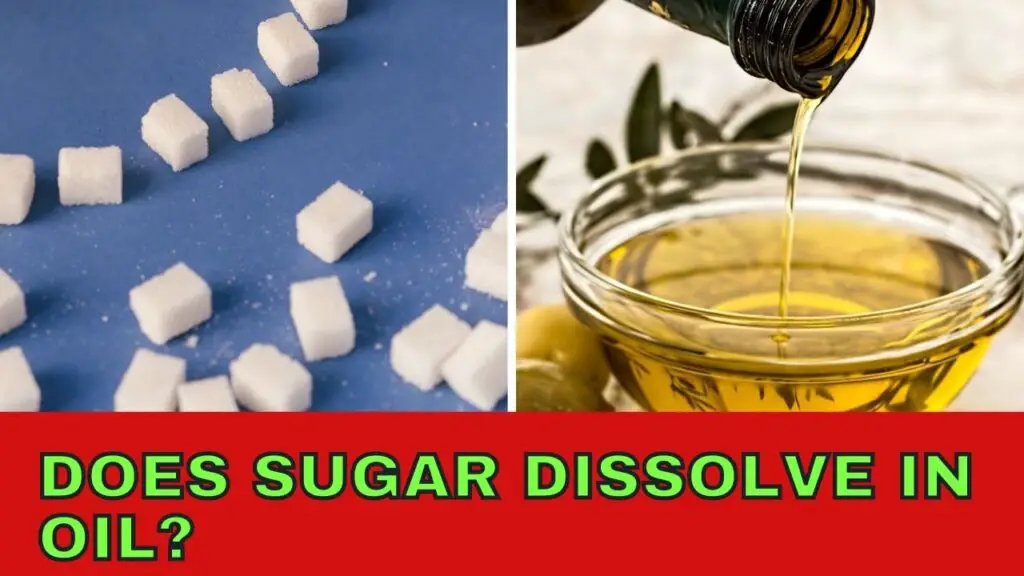When you’re baking in the kitchen, you likely use a lot of sugar. Whether you’re baking a cake or making custard, dissolving sugar adds sweetness. Sugar improves the taste of sweet treats, as well as hot drinks such as coffee, tea and hot chocolate.
Sugar is a valuable ingredient, but what will it dissolve in? This guide will tell you how sugar dissolves and in what substances. By the end of this article, you’ll understand how sugar can be used in the kitchen and avoid trying to dissolve it in non-polar ingredients.
The short answer to this title is no: sugar doesn’t dissolve in oil.
What Happens When You Mix Sugar With Oil?
You wouldn’t expect oil to dissolve in sugar because liquids can’t dissolve in solids. You may, however, expect sugar to dissolve in oil because sugar is a solid and oil is a liquid. This is a basic lesson you’ll have been taught at school. Surprisingly, however, sugar doesn’t dissolve in oil – and there’s a chemical reason why.
Sugar is made of molecules called sucrose. Sucrose is made up of carbon, hydrogen and oxygen. It’s C12H22O11, meaning it has 12 carbon atoms, 22 hydrogen atoms and 11 oxygen atoms.
Meanwhile, oil is made up of C-H bonds. It has carbon and hydrogen atoms only, and not oxygen. Because sugar has oxygen present in its composition, this creates a negative charge. The oil has a positive charge because oxygen isn’t present. Sugar has bonds that are polar, while oil has bonds that are non-polar.
As the sugar and oil have opposing charges, you’ll notice that they’re not attracted to each other in the saucepan. Instead, the sugar grains are drawn to other sugar grains, causing them to clump together. The oil doesn’t attract the sugar molecules at all, causing the two products to sit separately rather than enabling the sugar to dissolve into the oil.
Does Anything Dissolve In Oil?
You’ll find it difficult to dissolve anything in oil. Oil’s non-polar nature means that it repels most standard kitchen products. It’s not just sugar that you won’t be able to dissolve in oil. Salt won’t dissolve in oil either.
Does Sugar Dissolve In Fat?
Sugar doesn’t dissolve in fat. While sucrose is soluble in water, it’s not soluble in fat.
Does Sugar Dissolve In Milk?
You can dissolve sugar in milk. This is because milk is mostly made up of water, which is the best liquid to dissolve sugar into. Dairy milk from cows consists of approximately 85% water, which may surprise you. Plant-based alternatives, such as oat milk, almond milk and soy milk also contain high quantities of water, meaning that sugar will dissolve in them.
Sugar dissolves fastest in hot milk-based drinks. You’ll have noticed if you’ve ever tried to stir sugar into a cold drink that it dissolves incredibly slowly. This is true if you’ve added sugar to either iced coffee or iced tea to sweeten them.
The reason that your sugar will dissolve more quickly in hot drinks compared to cold drinks is that the heat creates more energy. This speeds up the process of dissolving. As the atoms in the hot milk-based drink move much faster, they collide with sugar molecules much more often, dissolving it faster.
Stirring the sugar rather than letting it sit will dissolve it even quicker because it moves the sugar at a faster speed, increasing the chances of sugar grains colliding with the base substance: milk.
Sugar will dissolve fastest as grains rather than as cubes. This is because, when pouring in grains, a larger surface area is exposed.
Conclusion
You won’t be able to dissolve sugar in oil or fat because the oxygen present in sucrose - which sugar is made of - creates a negative charge. This repels the sugar from the base materials of oil and fat that have a positive charge.
Sugar is, however, dissolvable in milk, whether plant-based or dairy. Milk is mostly made up of water, which is the best liquid for dissolving sugar into. Sugar is dissolved most quickly as grains and when stirred into hot drinks. Sugar is dissolved slower as cubes, when not stirred and when placed into cold drinks.
